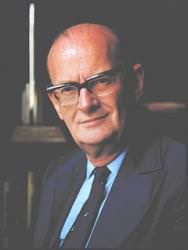Sir Arthur C. Clarke, writer, inventor and visionary, has died from heart failure at age 90. A master of science fiction, Clarke was known most for his futuristic book “2001†published in 1968, which was made into the landmark movie. Clarke wrote scores of fiction and non-fiction books, more than 100 short stories, and numerous articles and essays.
Some of his early books included
Interplanetary Flight
(1950),
Prelude to Space
(1951), and
The Making of a Moon
(1957). He wrote a series of “Odyssey†books:
2010: Odyssey Two
(1985) â€"also made into a movieâ€"and
2061: Odyssey Three
(1988) and
3001: The Final Odyssey
(1996). His last book was published in 2005,
The Last Theorem
.
Clarke foresaw many technological advances in his writing, describing, among other things, cell phones, the internet, and moon landings using a mother ship and a landing pod. He was also known as the “godfather of the telecommunications satellite.†In a 1945 article in Wireless World magazine, he outlined a worldwide communications network based on fixed satellites orbiting at 22,240 miles (42,000 km) â€" a geosynchronous orbit â€" often referred to as the Clarke Orbit.
Clarke was born December 16, 1917 in Somerset, England. From an early age he was interested in astronomy and science. During World War II he was a pioneer in using radar with the Royal Air Force. Later, he completed a college degree, with honors, in physics and mathematics at King's College in London. He was an editor for the journal Physics Abstracts when his first science fiction books were published.
Clarke spent most of his life promoting science and space exploration. He was an American Astronautical Society Fellow, the British Science Fiction Association President, an International Academy of Humanism Laureate, was on the National Space Society Board of Governors and Planetary Society Advisory Council, was a member of the Royal Astronomical Society and was Knighted by the British Empire in 2000. He has a nebula and an asteroid named after him.
Clarke suffered from post-polio syndrome since 1988 and sometimes had to use a wheelchair, but until recently, he still continued to scuba dive, one of his lifelong passions. His love of scuba diving brought him to Sri Lanka, where he lived since the 1950’s. Clarke once said he was “perfectly operational underwater.â€
On his 90th birthday, Clarke released a video, in which he talked about his life and accomplishments. “Sometimes I am asked how I would like to be remembered,†Clarke said. I have had a diverse career as a writer, underwater explorer and space promoter. Of all these I would like to be remembered as a writer.â€
 Universe Today
Universe Today
